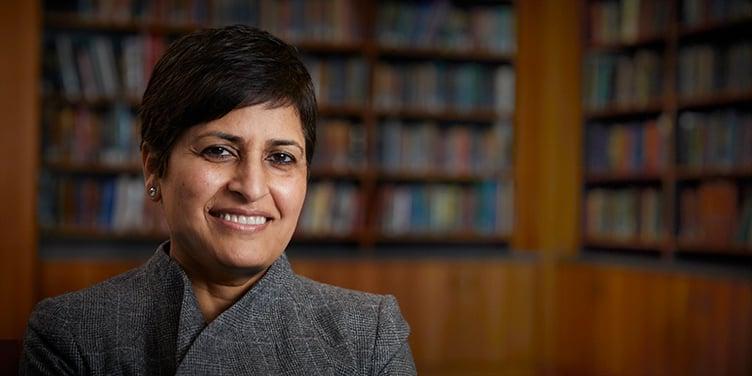Updated April 2024
流感和常见的寒冷天气呼吸道感染正在流行, along with COVID-19, 如果你真的生病了,弄清楚是什么让你生病并不总是那么容易.
We talked to UC San Francisco emergency care physician Jahan Fahimi, M.D., and infectious disease specialist Peter Chin Hong, M.D., about the differences between flu and COVID-19, when to get a test, and why you shouldn't try to diagnose yourself.
注意:如果你认为你正在经历危及生命或严重的情况, 拨打911或直接去最近的急诊室.
有可能区分流感症状和COVID-19症状吗?
“我认为这很难,因为流感和COVID-19可能有各种重叠的症状," said Fahimi. Those can include fever, chills and body aches, 上呼吸道症状,如流鼻涕和喉咙痛, lower respiratory symptoms like cough and pneumonia, and gastrointestinal symptoms like nausea, vomiting and diarrhea.
“虽然某些症状与一种病毒的关联程度略高于另一种病毒, there's enough overlap that there's uncertainty," cautioned Fahimi. “所以我们不会用这些症状的存在或不存在来排除任何一种疾病."
典型的流感症状相对一致:发烧、咳嗽和肌肉疼痛. These are also common in COVID-19, 但COVID-19的症状差异比流感更大, 从完全没有症状到致命的肺炎和无数的心血管和神经问题, said Chin-Hong.
"Influenza is engineered to cause disease, so once you get it, you're going to have symptoms and be stuck in bed," said Chin-Hong. "COVID depends on what soil it lands on. 一旦你感染了COVID,你可能会产生各种各样的后果."
Does COVID-19 have any telltale symptoms?
似乎与COVID-19更具体的一个迹象是嗅觉或味觉的突然丧失. 最初被低估为一种症状,现在被认为是常见的.
法希米说:“这是我对COVID-19特别担心的一个症状。. 另一个可能指向COVID-19的迹象是低氧饱和度, which can cause shortness of breath, 虽然如果没有脉搏血氧仪测量,通常不会被注意到.
金虹指出,有些症状是孤立的——比如过敏样症状, like runny nose and water eyes, 或腹泻本身——不太可能是COVID-19的征兆, 因为它们通常与疾病的其他症状同时发生.
10岁以下儿童感染COVID-19并出现症状的可能性较小, so if they have flu-like symptoms, they're more likely to have the flu, he added.
But these are generalizations. Thanks to the variable nature of COVID-19, 知道你是否被感染的唯一方法是做检查.
"I can't give you a magic formula," said Chin-Hong. “在一天结束的时候,真正能告诉你答案的是测试."
What should you do if you feel sick?
If you feel unwell and have any of these symptoms, 最好在家中进行自我隔离(包括避免与其他家庭成员接触),并进行COVID-19检测.
法希米说:“出于谨慎,我们必须尽可能抓住所有这些病例.
知道自己感染了COVID-19的好处是,你可以采取预防措施,防止疾病传播, 接触追踪器可以提醒你最近去过的人, 如果你的病情恶化,十大赌博平台排行榜可以跟进.
“我们也许能够先发制人,让某人更快地接受治疗, which could impact the course of their disease," said Fahimi.
流感测试也很普遍——通常需要去十大赌博平台排行榜办公室或紧急护理. 如果早期诊断出流感,可以用抗病毒药物达菲治疗.
即使你的COVID-19和流感检测结果均为阴性, 最好在症状消失后进行3天的自我隔离, said Fahimi. 阴性检测结果有很小的可能是错误的. Moreover, many other respiratory illnesses, from the common cold to croup, circulate during flu season, and spreading them would also spread uncertainty.
"Everyone's focused on the flu and COVID-19, but there's a whole host of other stuff going around, which can present very similarly," said Chin-Hong.
When should people seek medical attention right away?
Chin-Hong说,如果你感到呼吸急促,请立即就医. 例如,你可能会注意到,上楼梯时呼吸困难. 这可能是你的氧气水平低的迹象,可能是由于COVID-19.
If you're older, immunocompromised, 或有其他使您更容易感染COVID-19的健康状况, 如果你有任何症状,请尽快联系你的十大赌博平台排行榜, said Chin-Hong.
Do COVID-19 and the flu spread differently?
流感和COVID-19都主要通过咳嗽和打喷嚏时释放的呼吸道飞沫传播. But COVID-19 can also be transmitted more stealthily, 秦宏说:“通过说话或唱歌时释放的小水滴(“气溶胶”),这些小水滴可以在空气中徘徊。.
Also, COVID-19患者可以在出现症状前两天传播病毒,甚至从未出现症状. 许多COVID-19感染者是“无症状”的,这意味着他们没有任何症状. Chin-Hong说,相比之下,大多数流感患者都很清楚自己得了流感.
"That's why COVID-19 is so insidious. 人们甚至不知道他们被感染了,他们可以传播它,”他说.
What action can I take now?
The best way to avoid the "What do I have?“今年冬天的问题是打流感疫苗和戴口罩, washing hands and maintaining social distance.
“我们希望减少出现这些症状的人数,并首先做出这些决定, because they're going to be difficult," said Chin-Hong. "My advice is: Don't even be in this position."







